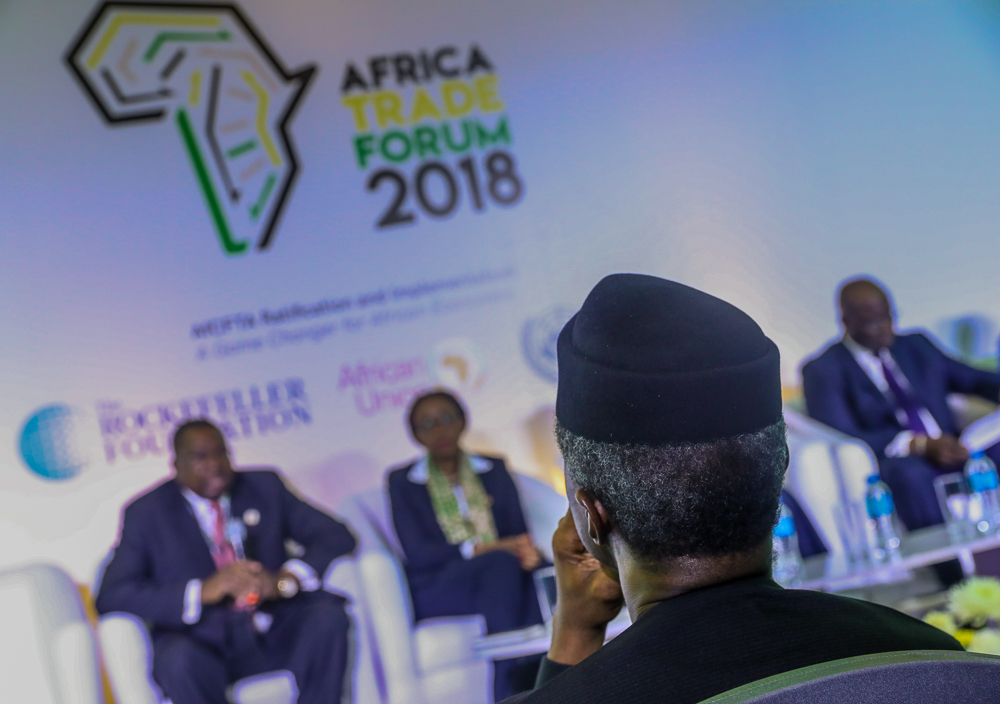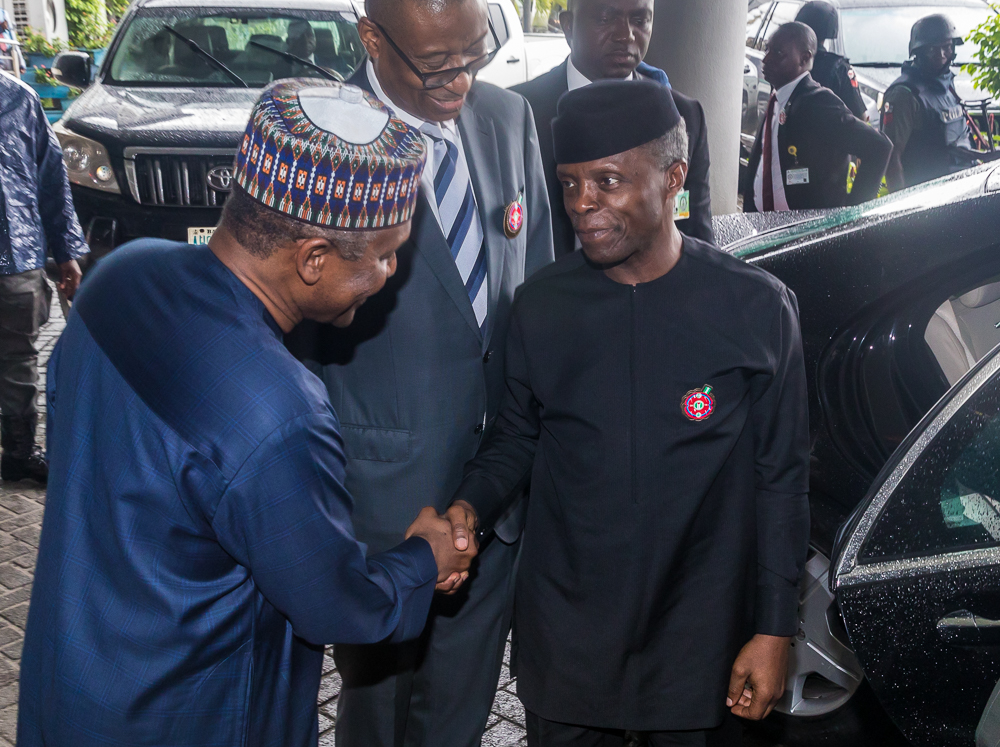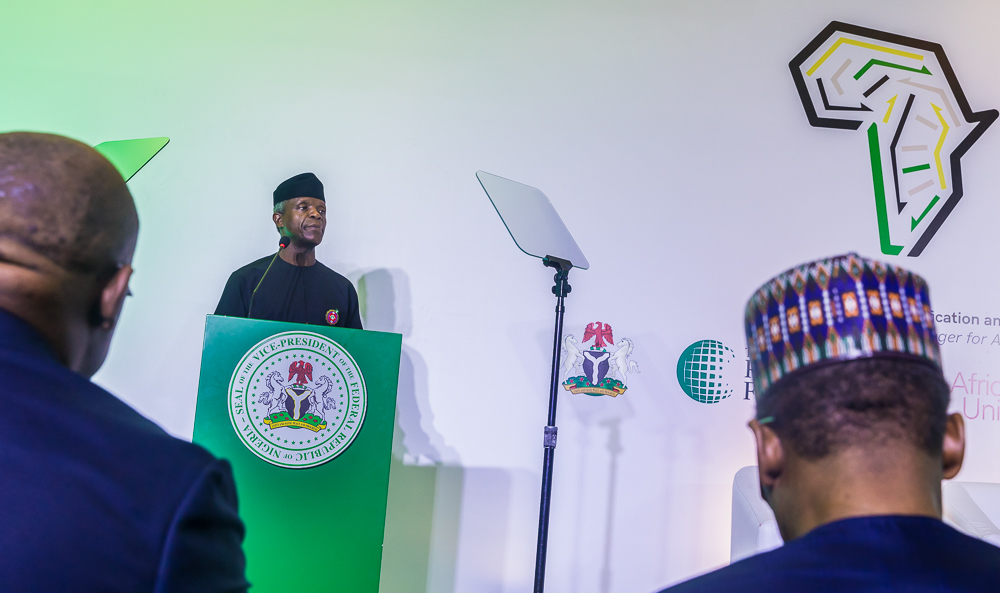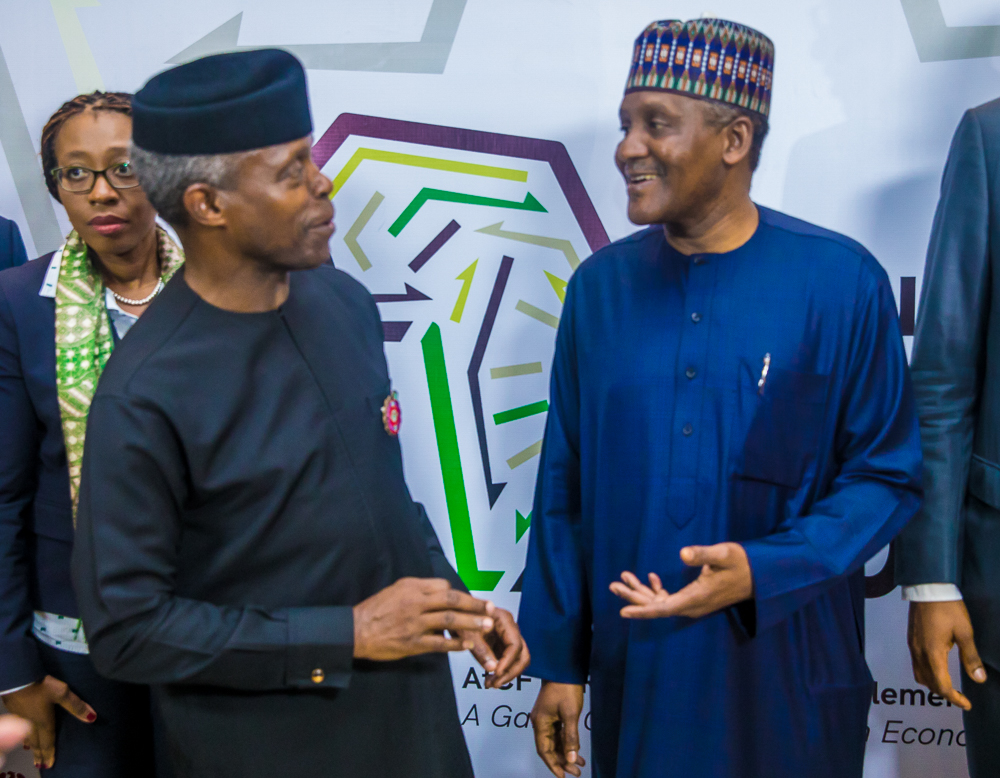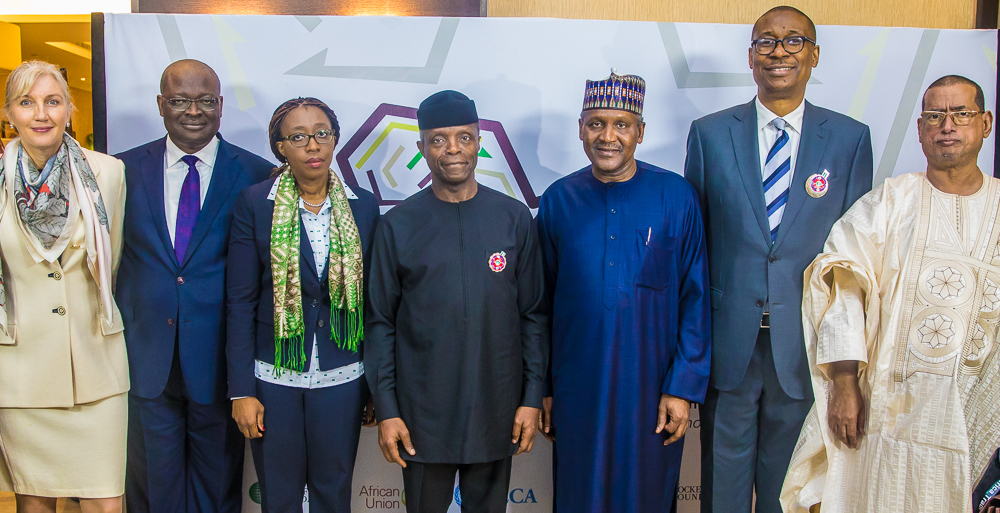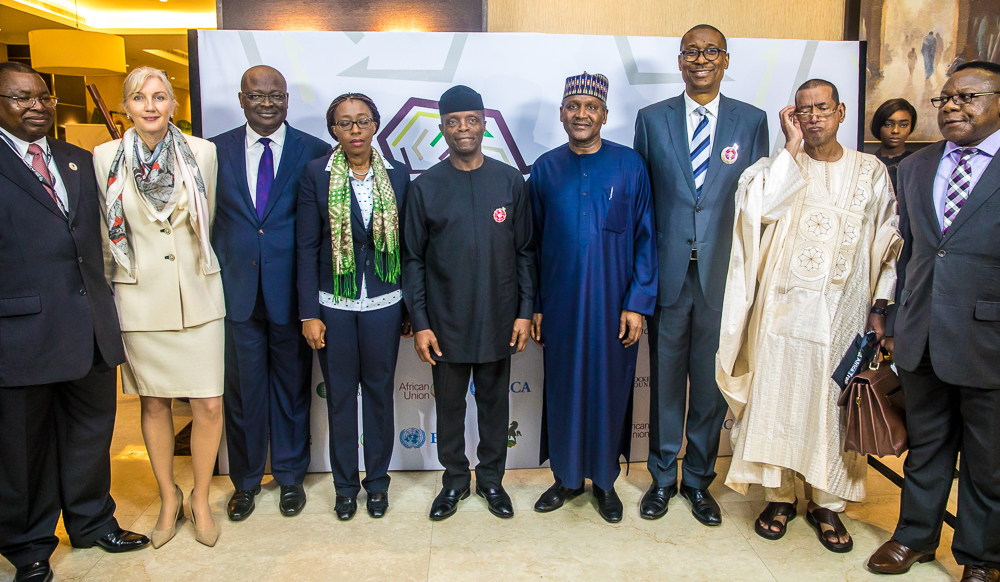Africa Trade Forum 2018,AfCFTA Ratification And Implementation: A Game Changer For African Economies
AFRICA TRADE FORUM 2018, AfCFTA RATIONCATION AND IMPLEMENTATION: A GAME CHANGER FOR AFRICAN ECONOMIES
“I should also say that, although the key bases have been consulted, this process of engagement has acquired a constructive and healthy momentum. This is desirable. We consider that for such a signal development on the continent, like the AfCFTA, the process must and should be subject to a democratic engagement to avoid any blowback. There are lessons on this score from the contemporary global economy.” – VP Osinbajo
KEYNOTE ADDRESS BY HIS EXCELLENCY, PROF YEMI OSINBAJO, SAN, GCON, VICE PRESIDENT OF THE FEDERAL REPUBLIC OF NIGERIA, AT THE AFRICA TRADE FORUM 2018,AfCFTA RATIFICATION AND IMPLEMENTATION: A GAME CHANGER FOR AFRICAN ECONOMIES, ON FRIDAY 2ND NOVEMBER, 2018
I am pleased to join The Governor of Lagos State, Mr. Akinwunmi Ambode, and Dr. Okechukwu Enelamah, Honourable Minister for Industry, Trade and Investment of Nigeria, to warmly welcome you all to Lagos, Nigeria. We are pleased to have you here in Lagos, Nigeria’s vibrant and energetic commercial nerve centre and Africa’s sixth largest economy.
As a metaphor for the purpose of our gathering, Lagos demonstrates that economies, cities and countries that are open, grow faster and prosper more than those that are closed. And Lagos is one such example, becoming very quickly, we are told, climbing up to the 5th largest economy in Africa.
Permit me to speak briefly on The Value of a Rigorous Domestic Process of Stakeholder Engagement for Trade Agreement. It is well over 7 months since the Agreement Establishing the African Continental Free Trade Area (AfCFTA) was signed in Kigali, Rwanda, on 21st March 2018.
The AFCTA is probably the most significant Pan African trade agreement in this generation. Its impact on commerce will also arguably be, the most profound of any agreement we have yet agreed to on the continent.
Since establishment, the pace of outreach to improve understanding, build capacity and sharpen expertise has accelerated. The Trade Negotiators have essentially done their job, although we now enter the more crucial business of negotiating the details of tariff offers and what to safeguard in the goods schedules and the specifics for the commitments for the trade and services schedules. In the meantime, it is time for policy-makers and stakeholders, with the support of regional institutions, across the continent, to do their own job. The objective now is to improve understanding of the stakes in play, the opportunities in the agreement, and to identify the concerns and challenges of stakeholders and how to address these.
My principal focus, therefore, is to share with you the stage of the on-going internal process in Nigeria and the results of outreach, sensitization and consultations with stakeholders, because everybody has been asking: so, what is Nigeria doing?
So, I think it might just be very helpful to fill in the gaps. The AfCFTA is now at the stage, in many senses for us, in a plural democracy like Nigeria, of a rigorous domestic consultative process and we are doing so. We are possibly the largest market in Africa today and most likely to benefit the most or lose the most from the implementation of the agreement.
We have also learned in some cases the hard way, with past international agreements. Also, we have had to bear in mind the on-going changes, particularly on trade, in the global economy.
Consequently, the purpose of Nigeria’s domestic process of sensitization and consultations has been to engage with stakeholders, systemically, robustly and constructively.
We have sought to understand their concerns and, at the same time, to build capacity, broaden the basis of consensus, and, in partnership, identify elements for a plan of engagement.
So, what have we done? What have we learned? What are the current state-of-play and envisaged next steps?
In March this year, we initiated nation and sector-wide stakeholder sensitization, outreach and consultations. In this exercise, the government team, led by Honourable Minister Enelamah engaged with the Decision-Making, Economic Governance and Advisory Institutions, such as the Federal Executive Council, the Economic Management Team, the Nigerian Governors Forum, as you know, we are country with a Federal Government and 36 states. Each of these has a governor.
We have consulted extensively with the governors’ forum, the Industrial Policy and Competitiveness Advisory Council; the National AfCFTA Stakeholder Forum; Industry and Sectoral Groups, Chambers of Commerce, Micro- Small and Medium Enterprises (MSMEs) and, the Nigerian Stock Exchange (NSE); Academia, Think Tanks, Policy Institutes, Civil Society; and stakeholders in all the 6 geopolitical zones of Nigeria, including visits to border communities with historic trade corridors into Central, Northern and Eastern Africa.
The last major grouping was done just a few days ago, at the Nigerian Institute of International Affairs (NIIA) on 31st October. Essentially, we have touched all major bases.
In this 8-month long exercise, approximately 34 groups and associations were sensitized and consulted, 3,500 natural persons were engaged directly, 5 Communiqués were adopted and signed in Nigeria’s 5 geopolitical zones with a Factual Summary issued in Lagos, codifying the substance of the consultations for the South West Geopolitical Zones.
Twelve private sector groups submitted inputs, autonomously, conveying their group positions on the AfCFTA, in response to the nation-wide call for inputs.
The process has been and remains serious, diligent, transparent and the subject of democratic scrutiny of evaluation and thorough assessment.
I should also say that, although the key bases have been consulted, this process of engagement has acquired a constructive and healthy momentum. This is desirable. We consider that for such a signal development on the continent, like the AfCFTA, the process must and should be subject to a democratic engagement to avoid any blowback. There are lessons on this score from the contemporary global economy.
Expectedly, the sensitization made evident diverse views and positions. While most stakeholders support AfCFTA, there are some stakeholders that are concerned, especially, about the impact of the AfCFTA. They take the view that caution should be exercised with thorough preparedness for any process of trade opening and integration.
Stakeholders in support, point to the market opportunities for growth for Nigerian exporters of goods and services and for industrialization through the economies of scale in a single market. They identify the mechanism for resolving trade disputes and the various platforms for trade cooperation. There were many favourable references to the Sub-committee for Customs Cooperation, Trade Facilitation and Transit, to be established and would deal with cross-border trade infractions and injurious practices.
Overall, there is virtual unanimity on the benefits of promoting intra-African trade for development, job creation, poverty reduction and modernization.
Across the board, all stakeholders, both those in favour and those with qualified support, pointed to issues where the policy-makers in Government are required to act and act in coordination, regionally. These specific areas requiring intervention and complementary policy action include:
-Effective rules-based trade remedy safeguards to ensure that third parties to the AfCFTA shall be prevented from the abuse of origin rules to trans-ship and dump. And this is a very big issue, of course, with a lot of Nigerian businesses, the abuse of origin rules especially where this could lead to dumping. Third parties to trade agreements should not benefit from the trade preferences in agreements to which their governments are not party to . And this is an issue that came up consistently.
-Predictable, cost-effective power supply. These are more internal issues.
-Expanding affordable trade finance, including micro-credits and finance for Micro-Small and Medium Enterprises (SMEs).
-Fostering an Enabling Environment for Business that eliminates:
-Multiple taxations by government and highway tolls,
-Internal checkpoints,
-Improvements in security.
-Investing in trade infrastructure (seaports, inland dry ports, road and railway networks). You must, of course, understand that many in the business community took the opportunity to give knocks on what they think the government was not doing adequately. So, you will see a lot of what is mentioned here, areas where many feel more needs to be done in order to strengthen local business for what they feel will be competition.
-Mainstreaming into the formal economy, the informal trade along historic trade corridors. This also is another issue that was considered quite important, of course, along the traditional trade corridors, there is already a lot of trade going on and many felt that should be mainstreamed with the formal economy even as we look at the implementation of the agreement.
– Empowering women in intra-African trade;
– Harmonizing the still divergent trade policies between and amongst African countries, starting with the trade practices within Regional Economic Communities (RECs). This is another issue that was emphasized.
I believe that most African policy-makers would accept these feedbacks from Nigeria as having wider validity, especially as having some validity with their own economy as well.
In response to the nation-wide stakeholder engagement last week, on 22nd October, President Buhari at a meeting with stakeholders, inaugurated and established the “Presidential Committee on Impact and Readiness Assessment on the African Continental Free Trade Area”. The Presidential Committee is now at work, in full steam. A final report will be sent up to Mr. President in 10 weeks.
As a Government, we consider that structural reforms should address the legitimate concerns raised by stakeholders. And we think that this is ongoing anyway and should not necessarily be an obstacle to the implementation of the agreement. This should be reflected in the report of the Presidential Committee.
As Chairman of the Nigerian Economic Management Team (EMT), I am pleased to read and hear that fellow African countries consider Nigeria’s domestic consultative process with Stakeholders as an applicable model. We engaged, constructively and robustly, with stakeholders, not only on the AfCFTA, but also on Trade Policy Writ Large. I believe that what emerged is illuminating. It holds lessons with precedential value. The feedback was simple and powerful.
The central message was support for the AfCFTA, based on a clear definition of increasing intra-African trade. The core feedback is to prepare thoroughly and, inter alia, ensure that the preferences of the AfCFTA would neither be abused nor be enjoyed by third parties that were not part of the negotiations.
The role of the AUC and UN-ECA is commendable indeed. Last week, H.E. Moussa Faki Mahamat, AU Chairperson undertook a visit to Nigeria with positive results. The Chairperson’s visit supported efforts at broadening consensus and deepening regional integration.
In closing, let me say that the process of domestic consultations in Nigeria, although stabilized and on a positive momentum, is unfinished. At the inauguration of the Presidential Committee on AFCTA last week, President Buhari emphasized, while commending the AFCTA process, as worthy and commendable, he said that the agreements we negotiate should be properly understood by those that would implement them, and be accompanied with an implementation plan. As the President said, “the AfCFTA is worthy and commendable”.
You have a full programme today and tomorrow. I am hopeful that the outcomes from this Africa Trade Forum will contribute to the process of sensitization and domestic consultations to broaden the base of consensus, not only in Nigeria but also in all countries of the African Union.
I pay tribute to the co-organizers: the UN-ECA, the AUC, the Rockefeller Foundation, and to the Nigerian Team that has contributed to organizing this activity.
Not least, I would like to acknowledge the presence of our own ECOWAS Commission. Nigeria is currently Chairing ECOWAS and I am aware of the efforts and contributions of the Commission, together with ECOWAS Senior Trade Officials.
So, I wish you very robust and fruitful deliberations in the coming days.
Thank you all very much.


